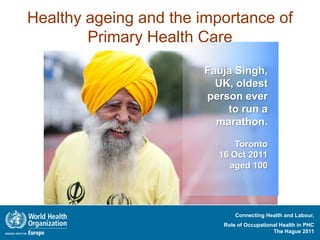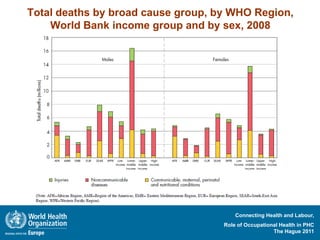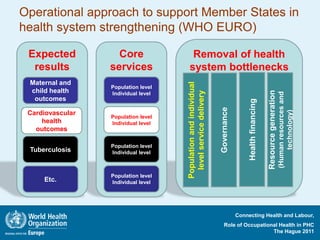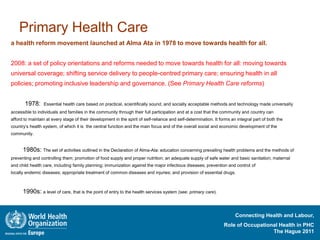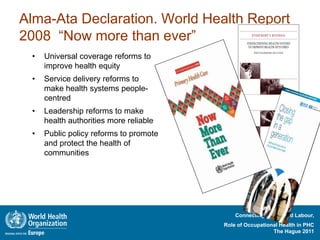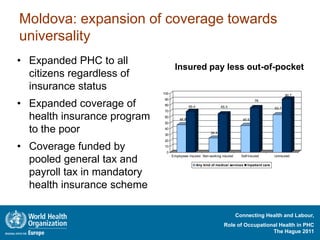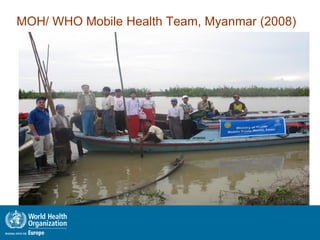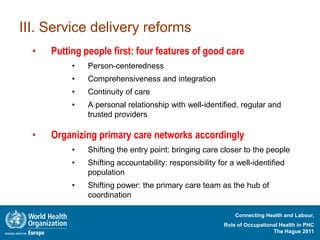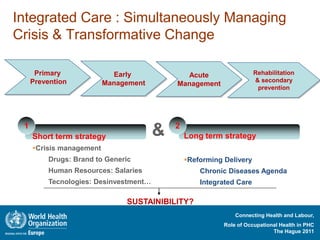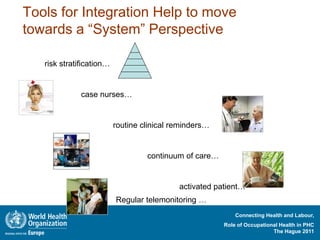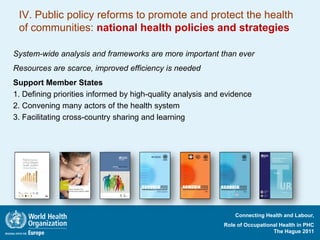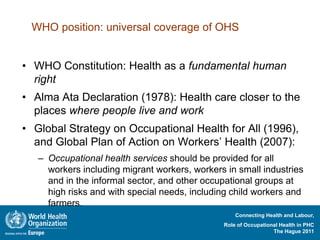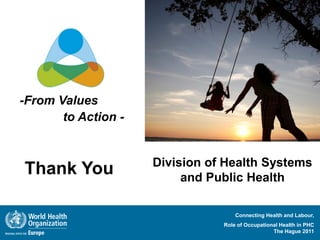Primary Health Care, Objectives, Principles and Policy Directions
- 1. Primary health care: Objectives, principles and policy directions Dr Hans Kluge Mrs Christine Beerepoot Mr Rokho Kim WHO Regional Office for Europe Connecting Health and Labour, Role of Occupational Health in PHC The Hague 2011
- 2. Healthy ageing and the importance of Primary Health Care Fauja Singh, UK, oldest person ever to run a marathon. Toronto 16 Oct 2011 aged 100 Connecting Health and Labour, Role of Occupational Health in PHC The Hague 2011
- 3. What do we talk about when talking about primary health care? An outline • NCD burden • Definitions • Policy documents • PHC Reforms • Partnership Dutch Government/WHO • Conclusions Connecting Health and Labour, Role of Occupational Health in PHC The Hague 2011
- 4. Total deaths by broad cause group, by WHO Region, World Bank income group and by sex, 2008 Connecting Health and Labour, Role of Occupational Health in PHC The Hague 2011
- 5. Prevalence of multiple chronic conditions increases steeply with age: Netherlands Source: van Baal et al, 2011, Co-occurrence of diabetes, myocardial infarction, stroke, and cancer: quantifying age patterns in the Dutch population using health survey data, Population Health Metrics Connecting Health and Labour, Role of Occupational Health in PHC The Hague 2011
- 6. Public health and health systems Public Health Health Systems Education Essential Public Health Operations Transport Population-based health services Other sectoral actors (beyond health Health Care Services: systems) with health generating activities Primary, secondary, tertiary Environment Prevention, protection, promotion Curative Individual health services Agriculture Tourism * Link to Health 2020, its governance, the whole-of-government and the whole-of-society approach Connecting Health and Labour, Role of Occupational Health in PHC The Hague 2011
- 7. Operational approach to support Member States in health system strengthening (WHO EURO) Expected Core Removal of health results services system bottlenecks Maternal and Population and individual Population level child health Resource generation level service delivery (Human resources and Individual level outcomes Health financing Governance technology) Cardiovascular Population level health Individual level outcomes Population level Tuberculosis Individual level Population level Etc. Individual level Connecting Health and Labour, Role of Occupational Health in PHC The Hague 2011
- 8. Primary Health Care a health reform movement launched at Alma Ata in 1978 to move towards health for all. 2008: a set of policy orientations and reforms needed to move towards health for all: moving towards universal coverage; shifting service delivery to people-centred primary care; ensuring health in all policies; promoting inclusive leadership and governance. (See Primary Health Care reforms) 1978: Essential health care based on practical, scientifically sound, and socially acceptable methods and technology made universally accessible to individuals and families in the community through their full participation and at a cost that the community and country can afford to maintain at every stage of their development in the spirit of self-reliance and self-determination. It forms an integral part of both the country’s health system, of which it is the central function and the main focus and of the overall social and economic development of the community. 1980s: The set of activities outlined in the Declaration of Alma-Ata: education concerning prevailing health problems and the methods of preventing and controlling them; promotion of food supply and proper nutrition; an adequate supply of safe water and basic sanitation; maternal and child health care, including family planning; immunization against the major infectious diseases; prevention and control of locally endemic diseases; appropriate treatment of common diseases and injuries; and provision of essential drugs. 1990s: a level of care, that is the point of entry to the health services system (see: primary care). Connecting Health and Labour, Role of Occupational Health in PHC The Hague 2011
- 9. Alma-Ata Declaration. World Health Report 2008 “Now more than ever” • Universal coverage reforms to improve health equity • Service delivery reforms to make health systems people- centred • Leadership reforms to make health authorities more reliable • Public policy reforms to promote and protect the health of communities Connecting Health and Labour, Role of Occupational Health in PHC The Hague 2011
- 10. Efficiency gains are imperative • Many effective policy instruments to mitigate impact of crisis focusing on cost reduction and efficiency gains ◦ Hospital reconfiguration ◦ Increased focus on primary health care ◦ Shift from inpatient to outpatient care ◦ Rational use of medicines ◦ Reduced prices of medical goods Connecting Health and Labour, Role of Occupational Health in PHC The Hague 2011
- 11. I. Universal coverage reforms to improve health equity. Ensure availability Eliminate barriers to access Organize social protection • But that is not enough: – mobilize beyond the health sector – give visibility to inequalities – reach the unreached Connecting Health and Labour, Role of Occupational Health in PHC The Hague 2011
- 12. Moldova: expansion of coverage towards universality • Expanded PHC to all Insured pay less out-of-pocket citizens regardless of insurance status 100 90.7 • Expanded coverage of 90 76 80 69.4 65.5 63.7 70 health insurance program 60 50 46.8 45.6 to the poor 40 30 24.4 20 • Coverage funded by 10 0 Employees insured Non-working insured Self-insured Uninsured pooled general tax and Any kind of medical services Inpatient care payroll tax in mandatory health insurance scheme Connecting Health and Labour, Role of Occupational Health in PHC The Hague 2011
- 13. MOH/ WHO Mobile Health Team, Myanmar (2008) Connecting Health and Labour, Role of Occupational Health in PHC The Hague 2011
- 14. II. Leadership reforms – Inclusive leadership and effective government • Recognition of the key role & responsibilities of government • Inclusive leadership and policy dialogue: from command-and- control to steer-and-negotiate • Matching growth in health expenditure with massive reinvestment in capacity for leading and governing the health sector Connecting Health and Labour, Role of Occupational Health in PHC The Hague 2011
- 15. The Tallinn Charter 2008: Health Systems for Health and Wealth The Tallinn Charter has: • inspired countries to act on their values to improve health and wealth; • affirmed a value-based approach to health system strengthening; and • empowered health ministries to lead change for health improvement. Connecting Health and Labour, Role of Occupational Health in PHC The Hague 2011
- 16. III. Service delivery reforms • Putting people first: four features of good care • Person-centeredness • Comprehensiveness and integration • Continuity of care • A personal relationship with well-identified, regular and trusted providers • Organizing primary care networks accordingly • Shifting the entry point: bringing care closer to the people • Shifting accountability: responsibility for a well-identified population • Shifting power: the primary care team as the hub of coordination Connecting Health and Labour, Role of Occupational Health in PHC The Hague 2011
- 17. PHC as a hub of coordination between hospitals and community care Connecting Health and Labour, Role of Occupational Health in PHC The Hague 2011
- 18. Partnership Ministry of Health the Netherlands and WHO Regional Office for Europe on Primary Health Care Connecting Health and Labour, Role of Occupational Health in PHC The Hague 2011
- 19. The benefits of Primary Health Care • Improved health outcomes at the population level • Improved equity in health outcomes and access to health services • Better efficiency of the health system as a whole, less costs • More satisfaction of users with health services Connecting Health and Labour, Role of Occupational Health in PHC The Hague 2011
- 20. Modernize PHC within the healthsystem Connecting Health and Labour, Role of Occupational Health in PHC The Hague 2011
- 21. Integrated Care : Simultaneously Managing Crisis & Transformative Change Primary Early Acute Rehabilitation Prevention Management & secondary Management prevention 1 2 Short term strategy & Long term strategy Crisis management Drugs: Brand to Generic Reforming Delivery Human Resources: Salaries Chronic Diseases Agenda Tecnologies: Desinvestment… Integrated Care SUSTAINIBILITY? Connecting Health and Labour, Role of Occupational Health in PHC The Hague 2011
- 22. Tools for Integration Help to move towards a “System” Perspective risk stratification… case nurses… routine clinical reminders… continuum of care… activated patient… Regular telemonitoring … Connecting Health and Labour, Role of Occupational Health in PHC The Hague 2011
- 23. IV. Public policy reforms to promote and protect the health of communities: national health policies and strategies System-wide analysis and frameworks are more important than ever Resources are scarce, improved efficiency is needed Support Member States 1. Defining priorities informed by high-quality analysis and evidence 2. Convening many actors of the health system 3. Facilitating cross-country sharing and learning Connecting Health and Labour, Role of Occupational Health in PHC The Hague 2011
- 24. Coverage of OHS in 21 countries 100 95 90 90 86 80 80 OHS can be provided to 80 70 70 Under-served population 70 through PHC system 60 60 50 50 50 50 48 50 39 40 34 30 28 30 15 20 10 10 5 4 Connecting Health and Labour, 0 Role of Occupational Health in PHC NET FIN SVN BEL FRA SWE JAP HUN DEN NOR POR ITA TUR POL UNK BUL GRE EST CHI The KEN SVK Hague 2011
- 25. WHO position: universal coverage of OHS • WHO Constitution: Health as a fundamental human right • Alma Ata Declaration (1978): Health care closer to the places where people live and work • Global Strategy on Occupational Health for All (1996), and Global Plan of Action on Workers’ Health (2007): – Occupational health services should be provided for all workers including migrant workers, workers in small industries and in the informal sector, and other occupational groups at high risks and with special needs, including child workers and farmers. Connecting Health and Labour, Role of Occupational Health in PHC The Hague 2011
- 26. A stepwise strategy for occupational Stage IV Comprehensive health services Service Stage III •In-company or International external special OHS units Standard Service •Comprehensive Objective for all! content: prevention, Stage II curative and Basic Service promotion & •OHS Infrastructure development services •ILO No. 161, 155 Stage I •PHC Infrastructure •Multidisciplinary Starting level content •Basic OHS content •Advice in OH •Prevention plus •Accidents and ODs•Toolboxes curative services •Acute ill-health •PHC Field nurse Physician and nurseMultidisciplinary Multidisciplinary Safety agent with short special team with special training specialists' team training Starting point for Connecting Health and Labour, Big industries and SMEs,SSEs,SEs,IFSSMEs,SSEs,SEs,IFS Big industries and Big OHS Centres Role of Occupational Health in PHC well organised The Hague 2011 SMEs
- 27. Conclusion • Commitment of member states for the need for change towards integrated health care with PHC at the heart • Redefine the role of hospitals • Involvement of community care and patient empowerment • Transformative education, role of nurses and paramedics • Increase efficiency and reduce costs protecting the vulnerable • Exchange best practices • ONE SIZE DOES NOT FIT ALL • WALK THE TALK: TAKE CARE OF OURSELVES ! Connecting Health and Labour, Role of Occupational Health in PHC The Hague 2011
- 28. -From Values to Action - Division of Health Systems Thank You and Public Health Connecting Health and Labour, Role of Occupational Health in PHC The Hague 2011


